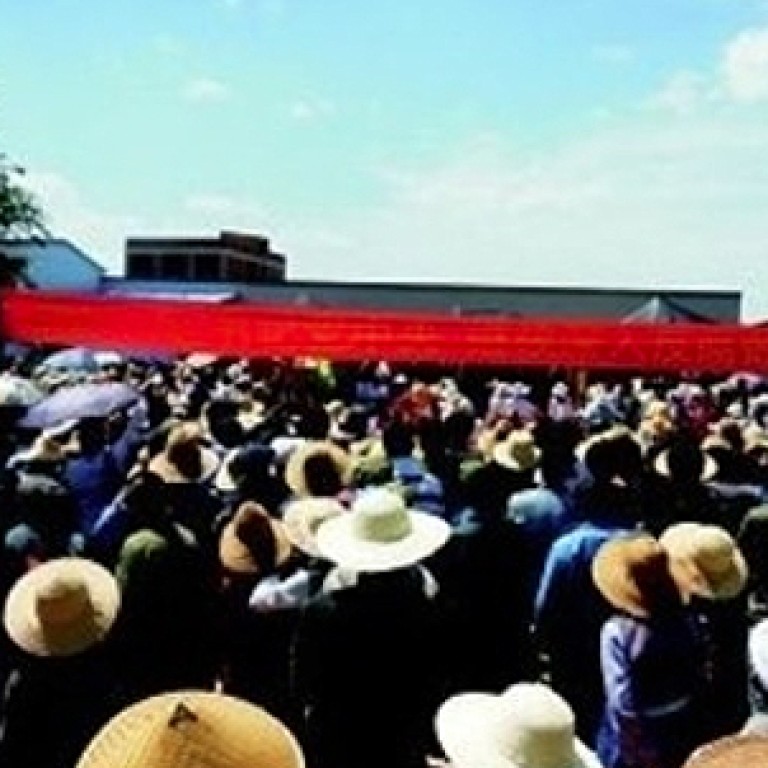
Kunming ex-official, 91, an unlikely leader for farmers fighting land seizures
Yunnan villagers heed the rally cry of Yang Weijun, who in May blasted corrupt officials during a massive gathering
When former deputy chairman Yang Weijun asked for his usual chauffeured limousine last month, a clerk informed him there was no car among the official fleet of the Yunnan government available to him.
Unfazed, the 91-year-old retired provincial leader called in a favour, and was able to sneak out from his Kunming retirement home by white delivery van. Thousands of farmers were waiting for him less than an hour’s drive outside the provincial capital.
We can overcome these feudal corrupt forces
Yang, who served on the Yunnan political consultative conference until 2000, addressed a large group of farmers from a dozen villages on May 13, blasting corrupt local officials for forcing the farmers to sell their lands.
“We hold this gathering to resolutely fight against these corrupt officials and protect our interests,” the nonagenarian told the crowd.
“We can overcome these feudal corrupt forces.”
As many as 10,000 people attended the rally, according to estimates by several people who were there. All of them said Yang’s presence prevented police from breaking up the gathering.
A journalist who attended the rally told the that his newspaper, an outspoken liberal publication, received orders not to report on the gathering.
Yang is no ordinary retired cadre living out his last years in privilege, many Kunming observers agree.
“He is not like today’s soft, well-nourished officials,” said his daughter Yang Duoqi, who now lives in Beijing. “He lived through the revolution, fought the Japanese, was sent to [do manual labour]. That makes you a different person.”
With the massive gathering in May, Yang tried once again to leverage his position to help farmers protest against the seizure of their land.
Jinning county, under the Kunming city government, had signed a 22 billion yuan (HK$28 billion) contract last year for the construction of the historic tourism park recreating the ancient Dian kingdom including artificial tribal village and a conference centre.
Yang and the villagers argued that their land could not be seized, even if they approved, because it was crucial farm land protected from redevelopment by national law.
The retired cadre said he called Kunming Mayor Li Wenrong, who – he said – promised to stop the project. At the time, Yang was full of praise for the chances of grass-roots activism under Communist Party rule.
One month later, the triumph of the “meeting of 10,000 people” faded. Land seizures continued.
“Only two villages are left, the rest were beaten, harassed and threatened into signing,” said Wang Chunyun, of Kunming, who works in home renovation and married into an affected family from Guangji village. He has been petitioning on their behalf.
Guangji and Anjiang villages’ 6,400 people are the only ones who have refused to sell their land to Northstar, Anjiang farmer Pu Yongfang said.
“They started taking the land in November. Since then, it hasn’t stopped. Even if they give us a million yuan per mu of land, we wouldn’t sell it,” said Pu. “But the others have given in.”
Distraught, Yang told the that travel restrictions have been imposed on him. He no longer gets the black limousine he has become accustomed to.
He said he had been barred from flying to Beijing to see his family and receive medical treatment.
“They are afraid I will go to Beijing and tell the central government about it,” said Yang. “The system [in Kunming] is wrong, and the powers they have are wrong.”
The system [in Kunming] is wrong, and the powers they have are wrong
Yang is the son of General Yang Ze, a founding member of Republican Tong Meng Hui, or Revolutionary Alliance, in Yunnan province that advocated the toppling of the Qing dynasty. The general also served as an adviser to China’s first president, Sun Yat-sen, before Yang was assassinated in 1925.
Yang Weijun himself was a leader of the student movement in Kunming, where he led the China Democratic League, a group of political parties banned by the Kuomintang government. The league continued to exist as a minority party in communist China.
When Mao Zedong clamped down on rightists in 1956, Yang was among the many sent to labour camps and work in the fields. “I was lucky I survived,” he said.
He was rehabilitated after the end of the Cultural Revolution and rose within the system until he retired in 2000.
Land seizures have become China’s most pressing problem, said Yang, and is the result of reckless economic growth. “The easiest way to pursue GDP growth is real estate development,” he said. “But it’s all fake [growth].”
The farmers had, however, achieved a small victory in recent weeks. A part of Anjiang’s village land has been officially declared arable, thus barring it from sale to the Northstar project, said villager Pu.
“When they give in and we can keep our land, we will have another mass gathering,” he said. “It’ll be a gathering to celebrate our victory.”
* Correction: An earlier version wrongly stated that Yang was 92 years old. He is only 91.

